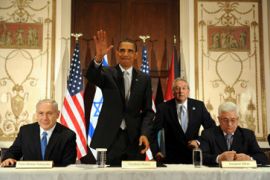Israeli-Palestinian talks to resume
First direct negotiations for almost two years to restart in September, US confirms.

Israel and the Palestinian leadership said that they had accepted the invitation, paving the way for talks that looked unlikely given the political deadlock between the two sides.
Clinton said on Friday that the talks will be held without preconditions and will run for a year with a view to creating a separate Palestinian state.
“There have been difficulties in the past. There will be difficulties ahead. Without a doubt, we will hit more obstacles. The enemies of peace will keep trying to defeat us and derail these talks,” she said.
No goodwill
Last month, the Arab League endorsed the idea of direct negotiations only if “measures and conditions” were met, a position shared by the Palestinian leadership.
But Israel insisted that they would only return to talks if no conditions were attached, setting up an impasse that appeared to rule out a return to the negotiating table.
The announcement comes as a surprise to many observers, who say that there has been no sign of the diplomatic breakthrough that many believed was a prerequisite for a resumption in talks.
Al Jazeera’s Jacky Rowland, reporting from Jerusalem, said there had been no improvement in relations between the two sides in recent weeks which could give momentum to the negotiations.
“You don’t see that there are conditions ripe on the ground for talks. You don’t see anything in terms of increased goodwill; in fact what you see on the ground rather is the opposite,” she said.
“One very much gets the impression that the driving reason why these talks are taking place, or are going to take place, is simply that the Americans want them to.”
Netanyahu has reacted positively to the news, saying Israel wants to conduct “serious and comprehensive talks” with the Palestinians. “Reaching an agreement is a difficult challenge, but is possible,” he said.
Decision criticised
Speaking before the Palestine Liberation Organisation voted to accept the US invitation, Saeb Erekat, the chief Palestinian negotiator, struck a more cautious tone.
“We hope the American administration and other Quartet members will work to make Israel refrain from settlement activities … and turn the words (of the Quartet statement) into deeds,” he said.
Hamas, which controls the Gaza Strip, has already criticised the decision to return to the negotiating table. Ismail Haniya, the Hamas leader in Gaza, said “nothing has been achieved” to warrant the resumption of talks.
Haniya also said Palestinians should concentrate on national reconciliation before peace with Israel. Hamas and Fatah movements have been estranged for years, and Egyptian attempts at mediation over the last few months have produced little progress.
Israel’s policy of building settlements on occupied Palestinian land is expected to be one of the most contentious issues in negotiations, with a self-imposed settlement freeze due to come to an end on September 26.
The freeze did not include East Jerusalem, and it has been routinely violated in the West Bank: The liberal Israeli group Peace Now documented 492 violations of the freeze in a report issued earlier this month.
Netanyahu is under pressure from the US to extend the freeze, but he has warned repeatedly that an extension could cause his right-wing government to collapse.
The issue of settlements is deeply divisive in Israel, where numerous polls have found public opinion almost evenly split on Netanyahu’s freeze.
The most recent survey, a July poll from the Jerusalem Media and Communications Centre, found that 52 per cent of Israelis favour restarting construction when the freeze ends; 42 per cent supported extending the moratorium.
Deadline pressure
Al Jazeera’s Nick Spicer, reporting from Washington, DC, said the impending end of the Israeli settlement freeze had concentrated America’s efforts on restarting the talks.
“What really put pressure on the whole process and the resumption of direct talks was President Obama’s fear that the expiration of the moratorium on building new settlements expires September 26, and that would completely break down what was left of the peace process,” he said.
The Palestinian Authority broke off direct talks with Israel in December 2008, when Israel launched a three-week war in the Gaza Strip. Obama has spent the last 18 months trying to cajole both sides into restarting a dialogue.
He pushed earlier this year for “proximity talks,” indirect negotiations moderated by George Mitchell, Obama’s Middle East envoy.
Abbas and the Arab League agreed in March to begin indirect talks, which were almost immediately postponed following Israel’s announcement of 1,600 new homes in the illegal East Jerusalem settlement of Ramat Shlomo.
The negotiations finally began in May, and Abbas said he would give them four months to show progress.
After the resumption of direct talks were formally announced, the White House said it was “very hopeful” about their outcome.